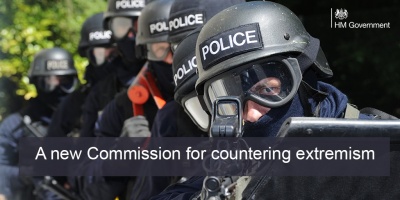Commission for Countering Extremism

The Commission for Countering Extremism is a legal body set up by the British Conservative government in 2018 'to stamp out extremist ideology in all its forms'.
It is tasked with identifying and challenging extremism, advising ministers on new policies and promoting 'pluralistic British values'.
Contents
Controversy over choice of new extremism tsar
In January 2018 home secretary Amber Rudd announced she had appointed women's rights campaigner Sara Khan of Inspire to lead the commission, prompting strong criticism from politicians such as Baroness Warsi and Labour MP Naz Shah as well as Muslim groups. [2]
Former Tory chairwoman Sayeeda Warsi called it 'a deeply disturbing appointment', tweeting:
- Sara has unfortunately been a strong advocate of the government’s policy of disengagement, a policy which many, including members of the police and intelligence services, consider has damaged the important battle to engage Britain’s Muslim communities. For the commissioner to be effective the person had to be an independent thinker, both connected to and respected by a cross-section of British Muslims. Sara is sadly seen by many as simply a creation of and mouthpiece for the Home Office.”[3]
A petition to the Home Office signed by 100 Muslim organisations and scholars the following day called for Khan to be removed from her new role. It was, they wrote, a "deeply flawed and inappropriate" appointment. [4]
Founders of the Muslim Women’s Collective, Bushra Wasty and Sulekha Hassan, argued in the Guardian that 'the choice [of Khan] calls to question the government’s overall approach. Is it one that encompasses the far right, which has increasingly inspired violent attacks? Or does it intend to heavy-handedly single out Muslims, which would reinforce the feeling of a community under constant scrutiny?' Like Baroness Warsi, Wasty and Hassan emphasised how Khan's longstanding support for and links to the government's Prevent strategy was a key issue which 'has made it especially important that she builds bridges with other Muslims'. [5]
Supporters
- David Anderson QC, the former independent reviewer of terrorism legislation cautiously welcomed Khan's appointment on Twitter, saying: 'I for one will be giving Sara a fair chance, and wishing her the good luck that I suspect she will need! 'The idea that she is a Government stooge is hard to reconcile with her opposition (strongly shared by me) to its ill-advised 2015/16 plans for a Counter-Extremism Bill.'
- Louise Casey
- Quilliam Foundation
- Communities Security Trust
=Khan's response
In a Guardian op-ed Khan wrote that 'as anti-extremism chief, I hear my critics – but I’ll listen to victims too'. She said that 'doing nothing is no longer an option' and that 'my first act will be to carry out a comprehensive study of the scale, influence and reach of extremism in Britain.'
External resources
Bushra Wasty and Sulekha Hassan, Why we’re concerned about Sara Khan, the new anti-extremism chief, Comment is Free, guardian.co.uk 25 January 2018
Contact
- Address:
- Website:
Resources
Notes
- ↑ Alan Travis, Home Office evokes Orwellian vision of anti-extremism commission, 21 June 2017
- ↑ Jamie Grierson, Choice of new UK anti-extremism chief criticised as 'alarming', Guardian, 25 January 2018, accessed same day
- ↑ Jamie Grierson, Choice of new UK anti-extremism chief criticised as 'alarming', Guardian, 25 January 2018, accessed same day
- ↑ New counter-extremism tsar Sara Khan facing calls to quit, Sky News, 25 January 2018, accessed 31 January 2018
- ↑ Bushra Wasty and Sulekha Hassan, Why we’re concerned about Sara Khan, the new anti-extremism chief, Comment is Free, guardian.co.uk 25 January 2018